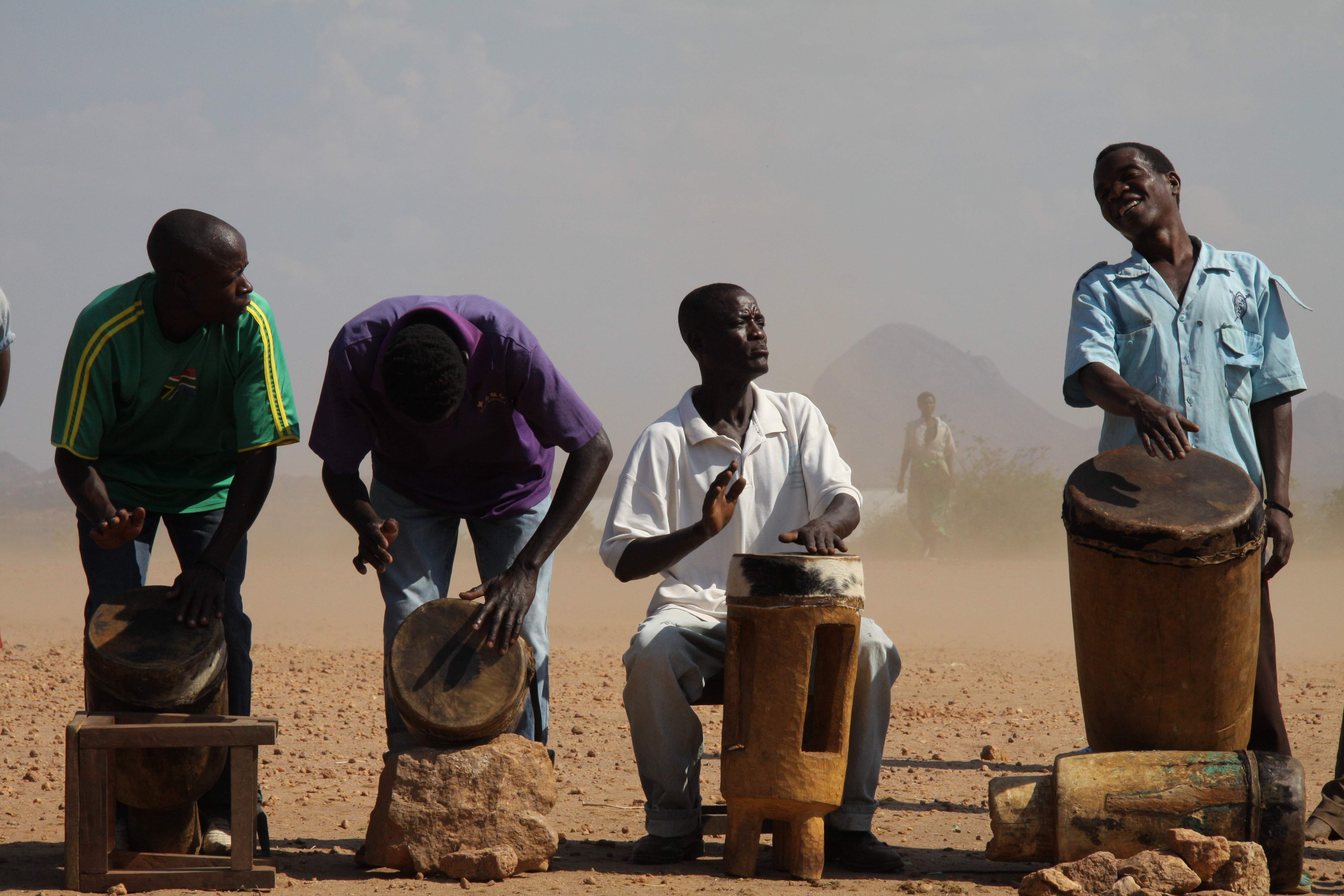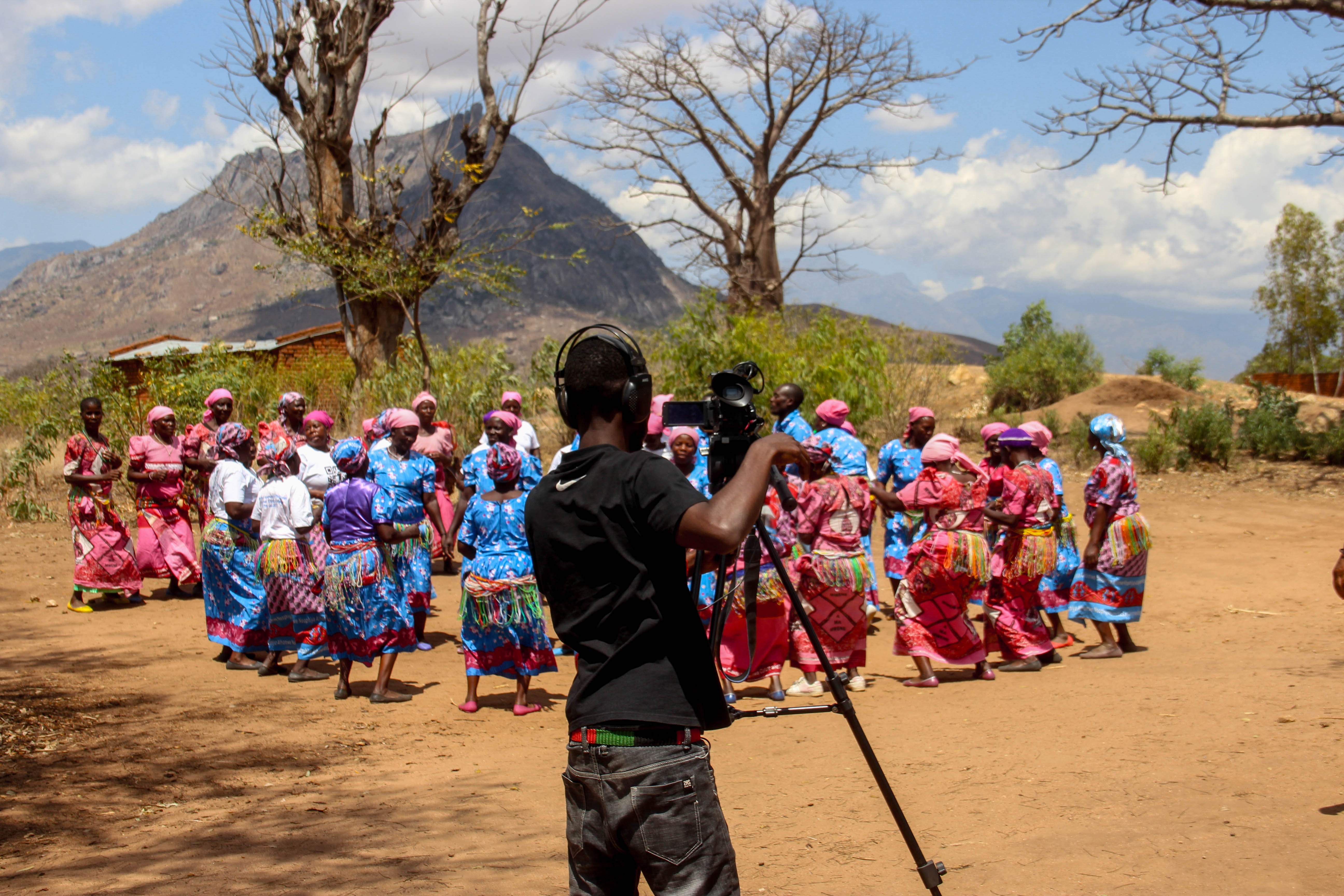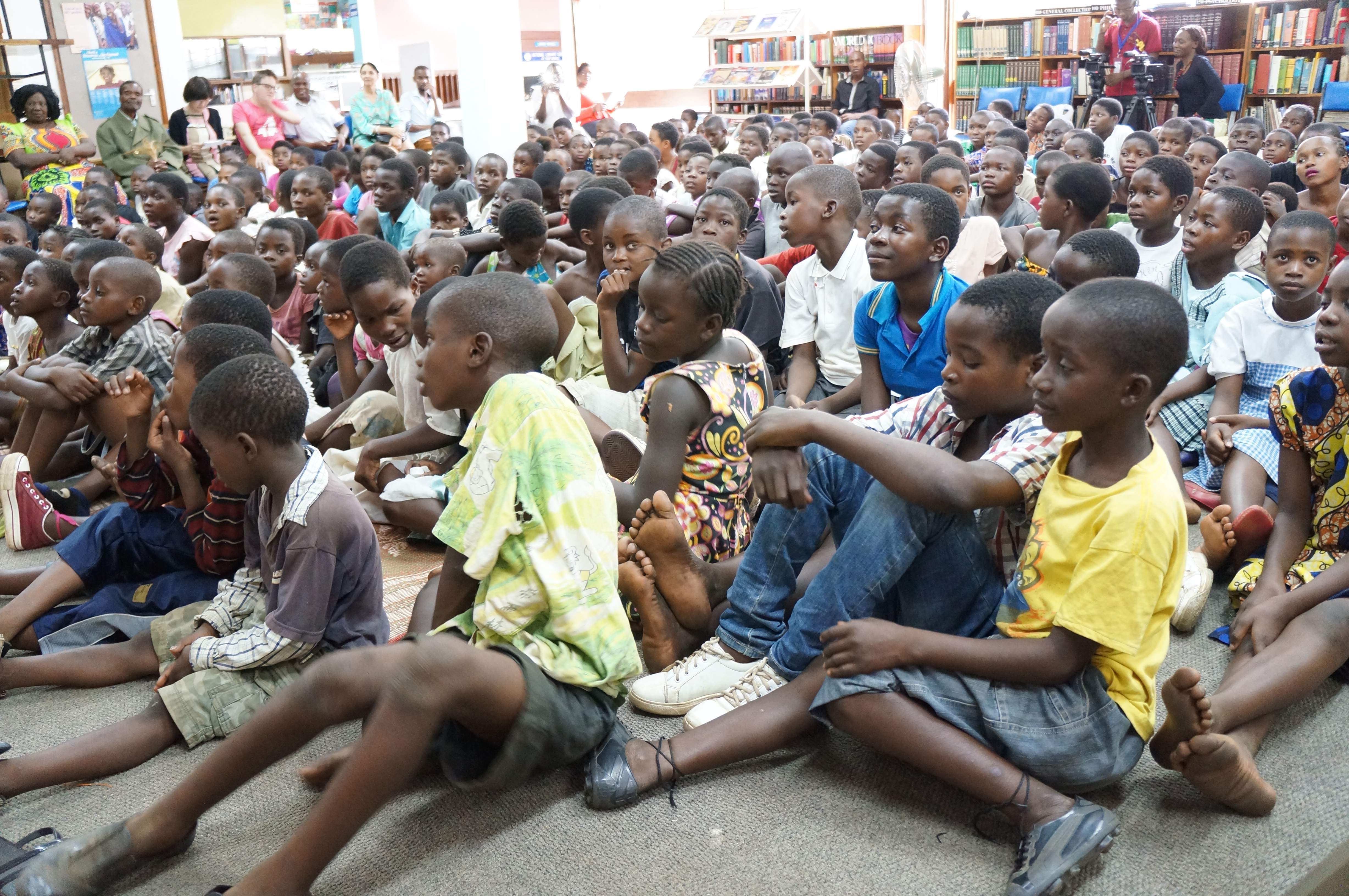A new repository for Malawi’s cultural heritage
21 October 2021

Malawian drummers in a folksongs performance
Over the past ten years, Rei Foundation has collaborated with the Malawi National Commission for UNESCO (MNCU), the Malawi National Library Service (NLS), Sony and non-profit organisation Music Crossroads Malawi (MCM) to travel throughout Malawi seeking and documenting the performance of folktale storytelling and folk songs. These projects amassed many hundreds of audio and video recordings, transcriptions and sheet music of stories and folk songs in languages spoken across Malawi. These documents are the cultural property of the Malawian people (rather than a private collection), but there is a need to make them available to all of Malawi’s citizens and residents.
Importance of folk traditions in Malawi
Rei Foundation’s Malawi-based project manager Chimwemwe Sumani explains the role of storytelling in Malawi society; “Apart from its strength of entertainment, it has a positive way of promoting peaceful coexistence and impacting the lives of people of various backgrounds, differences in age, tribe, education level, career and social status.”
Importance of folk traditions in Malawi
Rei Foundation’s Malawi-based project manager Chimwemwe Sumani explains the role of storytelling in Malawi society; “Apart from its strength of entertainment, it has a positive way of promoting peaceful coexistence and impacting the lives of people of various backgrounds, differences in age, tribe, education level, career and social status.”
Initially, the folk heritage collections provided the basis for further outreach projects around Malawi, underpinned by the mission of safeguarding and celebrating the art of traditional Malawian folktales and folksongs and the people who participate in their performance. Various strategies (including the adaptation of folk stories into theatre plays, television shows and regular storytelling sessions at NLS branches) have been employed to provide access to and create momentum for the revitalisation of this cultural heritage that embodies local values and yet is in danger of being lost. In recent years, a new folktale documentation project took place working with the diverse residents at Dzaleka refugee camp in Dowa, Malawi, which resulted in further sharing of the multicultural traditional folktales through storytelling sessions for kids at Dzaleka. The next step is to create a central repository with all the recordings and accompanying contextual knowledge, accessible by all residents of Malawi.

Recording of a folksong performance
Safeguarding intangible cultural heritage
Christopher Magomelo, Senior Assistant Executive Secretary (Culture) at MNCU, explains that safeguarding intangible cultural heritage (ICH) is a key rationale for this database: “According to the UNESCO 2003 Convention for the Safeguarding of the Intangible Cultural Heritage, three of the ways to safeguard ICH are through documentation, study and transmission. Transmission is from the practitioners to younger people, peers, and people who are not members of the practicing community. Creating a database and website containing the ICH elements satisfies all three safeguarding measures. It allows others outside the practicing communities to learn about and also practice the element if they so wish.”
Creating access across the country
The aim of the database is to enable people from all over Malawi to access the documentation of cultural heritage. The solution needed to consider both the cultural and infrastructural context of the country. The project team, which includes NLS, MNCU, Rei Foundation and Auckland-based design agency ALT Group, have a mandate to create something that is culturally appropriate, relevant and technically suitable to the Malawian context. The database will allow for the full cache of folk stories and songs to be accessible from public libraries across Malawi. The in-library database will sync from a secure master database but can operate independently from it: in times of limited internet connection, the in-library database will be fully operational, offline, for library users. Nyali adds that the impact of the database won’t just be better organised records and ease of access, but “it will bring back the folktales into our culture using modern technology, for the current generation, and provide general entertainment for all who access it.”
Christopher Magomelo, Senior Assistant Executive Secretary (Culture) at MNCU, explains that safeguarding intangible cultural heritage (ICH) is a key rationale for this database: “According to the UNESCO 2003 Convention for the Safeguarding of the Intangible Cultural Heritage, three of the ways to safeguard ICH are through documentation, study and transmission. Transmission is from the practitioners to younger people, peers, and people who are not members of the practicing community. Creating a database and website containing the ICH elements satisfies all three safeguarding measures. It allows others outside the practicing communities to learn about and also practice the element if they so wish.”
Creating access across the country
The aim of the database is to enable people from all over Malawi to access the documentation of cultural heritage. The solution needed to consider both the cultural and infrastructural context of the country. The project team, which includes NLS, MNCU, Rei Foundation and Auckland-based design agency ALT Group, have a mandate to create something that is culturally appropriate, relevant and technically suitable to the Malawian context. The database will allow for the full cache of folk stories and songs to be accessible from public libraries across Malawi. The in-library database will sync from a secure master database but can operate independently from it: in times of limited internet connection, the in-library database will be fully operational, offline, for library users. Nyali adds that the impact of the database won’t just be better organised records and ease of access, but “it will bring back the folktales into our culture using modern technology, for the current generation, and provide general entertainment for all who access it.”
Janson Chau, design director for Alt Group, is looking forward to collaborating on this project. He says, “We believe in safeguarding and sharing culture, and are interested in how design can be in service of expressing and driving it. This project is an opportunity for us to learn about a place and a people we haven't encountered before. The team in Malawi, with the support of Rei Foundation, have captured an amazing archive of material and we're looking forward to contributing to that by creating something that can provide access and ensure it is meaningfully connected to the people and carried into the future.”
Libraries: the heart of the community
That the database is available at NLS branches is another step in ensuring the documentation is widely accessible. Sumani explains, “The people of Malawi already trust and know NLS as their informal school, college and university, a home of our tangible and intangible cultural heritage resources in print as well as audiovisual format.” Nyali says the mandate for NLS is to organise, preserve and make available the nation’s folksong and folktale material for a diverse audience, including artists, researchers, writers, folklorists, students and teachers of primary and secondary schools, university Students, librarians, and documentarists, children and their families.
Tiwonge Chavinda, who is now 13 years old, has been attending storytelling sessions at the Lilongwe branch of NLS for years now. He also takes computer skills classes at the library, and says “It would be nice to have the folktales on the computers at the library. This will help us remember the old stories that grandparents used to tell when we were not born. We will be able to see them and enjoy their stories even when they are not physically here with us, and at any time.”
Libraries: the heart of the community
That the database is available at NLS branches is another step in ensuring the documentation is widely accessible. Sumani explains, “The people of Malawi already trust and know NLS as their informal school, college and university, a home of our tangible and intangible cultural heritage resources in print as well as audiovisual format.” Nyali says the mandate for NLS is to organise, preserve and make available the nation’s folksong and folktale material for a diverse audience, including artists, researchers, writers, folklorists, students and teachers of primary and secondary schools, university Students, librarians, and documentarists, children and their families.
Tiwonge Chavinda, who is now 13 years old, has been attending storytelling sessions at the Lilongwe branch of NLS for years now. He also takes computer skills classes at the library, and says “It would be nice to have the folktales on the computers at the library. This will help us remember the old stories that grandparents used to tell when we were not born. We will be able to see them and enjoy their stories even when they are not physically here with us, and at any time.”

Children enjoying a storytelling session
Website to promote wider access
The second part of the project is an outward-facing website featuring a curated selection of folksongs and folktales. Magomelo says, “MNCU, NLS and MCM will collaborate in deciding which documents are available online based on themes and geographic representation of the elements.” He also explains that limiting the amount of stories and songs online also limits the potential for appropriation. “Prevention of unscrupulous use of the data is also a major consideration. Some types of elements do not necessarily have to be shared because they could be prone to abuse or misrepresentation by users who may not understand their significance and cultural background for lack of information”, he says.
The second part of the project is an outward-facing website featuring a curated selection of folksongs and folktales. Magomelo says, “MNCU, NLS and MCM will collaborate in deciding which documents are available online based on themes and geographic representation of the elements.” He also explains that limiting the amount of stories and songs online also limits the potential for appropriation. “Prevention of unscrupulous use of the data is also a major consideration. Some types of elements do not necessarily have to be shared because they could be prone to abuse or misrepresentation by users who may not understand their significance and cultural background for lack of information”, he says.
Looking forward
So, what will a positive result look like? To Janson Chau, it is “maintaining the culture and histories held within the archive and encouraging it to be shared. For people to access information so they can understand a part of who they are and where they come from. And that unique cultural expressions can be carried forward to grow and change alongside the people.” For young Tiwonge, it “will make it possible for us to come to the National Library to watch the folktales during weekdays and at any time when we are free. This is what I will enjoy the most. [Watching the] folktales will give us more wisdom to apply at school and we will grow with good manners.”
Sumani is aware of the limited arenas for young Malawians to hear traditional folk stories and songs. “I believe that this is one of the best ways to disseminate our diminishing intangible cultural heritage”, she says. “Development of this system will be very time-consuming and also require deep thinking and intensive research. At the same time, it's going to be super exciting to be building something so impactful for my beautiful country, Malawi.”
So, what will a positive result look like? To Janson Chau, it is “maintaining the culture and histories held within the archive and encouraging it to be shared. For people to access information so they can understand a part of who they are and where they come from. And that unique cultural expressions can be carried forward to grow and change alongside the people.” For young Tiwonge, it “will make it possible for us to come to the National Library to watch the folktales during weekdays and at any time when we are free. This is what I will enjoy the most. [Watching the] folktales will give us more wisdom to apply at school and we will grow with good manners.”
Sumani is aware of the limited arenas for young Malawians to hear traditional folk stories and songs. “I believe that this is one of the best ways to disseminate our diminishing intangible cultural heritage”, she says. “Development of this system will be very time-consuming and also require deep thinking and intensive research. At the same time, it's going to be super exciting to be building something so impactful for my beautiful country, Malawi.”

A storytelling performing
Return to Journal



